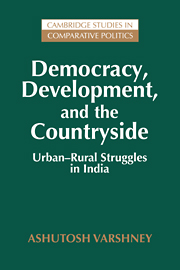Book contents
- Frontmatter
- Contents
- Preface
- A note on primary sources
- Introduction
- 1 Town–country struggles in development: A brief overview of existing theories
- 2 Nehru's agricultural policy: A reconstruction (1947–1964)
- 3 Policy change in the mid-1960s
- 4 The rise of agrarian power in the 1970s
- 5 Organizing the countryside in the 1980s
- 6 Has rural India lost out?
- 7 The paradoxes of power and the intricacies of economic policy
- 8 Democracy and the countryside
- Appendix: Liberal trade regimes, border prices, and Indian agriculture
- Index
- Titles in the series
7 - The paradoxes of power and the intricacies of economic policy
Published online by Cambridge University Press: 02 December 2009
- Frontmatter
- Contents
- Preface
- A note on primary sources
- Introduction
- 1 Town–country struggles in development: A brief overview of existing theories
- 2 Nehru's agricultural policy: A reconstruction (1947–1964)
- 3 Policy change in the mid-1960s
- 4 The rise of agrarian power in the 1970s
- 5 Organizing the countryside in the 1980s
- 6 Has rural India lost out?
- 7 The paradoxes of power and the intricacies of economic policy
- 8 Democracy and the countryside
- Appendix: Liberal trade regimes, border prices, and Indian agriculture
- Index
- Titles in the series
Summary
The last chapter emphasized three constraints on rural power: technical change, income distribution, and fiscal compulsions. This chapter asks whether these constraints are in some sense binding or are they politically changeable. For if they are politically manipulable, another set of questions needs to be addressed. Couldn't something be done about reversing the deceleration of technical change in agriculture? Couldn't the purchasing power of the poor be increased? Couldn't a higher fiscal burden be borne?
These questions have an unmistakably political dimension. The pricing and subsidy decisions, after all, emerge within the state. If all political parties are for higher prices, if farmers are also putting pressure on the government, if the Commission on Agricultural Costs and Prices (CACP) is becoming increasingly ruralized, if its terms of reference have been changed in favor of the countryside, then where is the counterpressure born? Obstructing the political power of the peasantry, which institutions and groups represent these abstract forces – technical change, income distribution, and fiscal constraint – in the political system? How are they able to impose their will on institutions and groups that might represent the farmers?
Stated differently, an explanation in terms of technical change, income distribution, and fiscal compulsions can only be a proximate explanation for the constraints on rural power. An underlying explanation should also deal with the mechanisms, institutions, and groups through which these abstract forces express themselves.
- Type
- Chapter
- Information
- Democracy, Development, and the CountrysideUrban-Rural Struggles in India, pp. 174 - 190Publisher: Cambridge University PressPrint publication year: 1995



